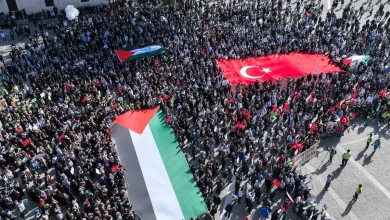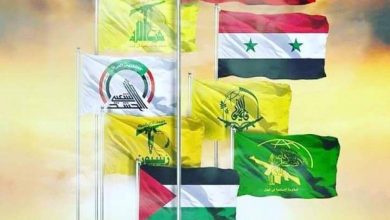Washington Modifies ’Arab Spring’ Plan

The recent stance of US State Secretary John Kerry, who has just winded up his first official tour in the Arab region, sparked a wave of speculations about how far the US-Russian negotiations have gone and the real climate of relations between Washington and Tehran.
Washington’s position came amid sharpened rifts among the Syrian opposition, in a clear-cut reflection of the stances foreign countries are bound to follow. Moaz al-Khatib, who is swimming with the US tide, has previously said he was ready for dialogue with the regime, while the group opposing him, influenced by KSA, Qatar, and Turkey, sternly objected to this option and sought to form its own government. But Washington, which has started to look at Syria though its wide-ranging international interests, is watching, with keen concern, the grip of “al-Nusra Front” and its subordinates over the field and the looming subsequent dangers.
Basically, Washington saw that the project it reckoned on in the region through the advent to power of “moderate Islam,” embodied by the open wing of the Muslim Brotherhood, was actually built on illusions in some of its aspects, just like the administration of George W. Bush had built idealistic projects with the occupation of Iraq. The coalition with the Muslim Brotherhood has been already broached as the Iraq project stumbled, that is before Barack Obama arrived at the White House, more specifically in 2006. The Turkish government has taken charge to advertise for this project in Washington, through Recep Tayyip Erdogan.
Therefore, many thought that Obama has shined suddenly in the presidential elections campaigns in 2007 and 2008 owing to the bet on the project of the Islamic change in the Middle East, especially that the US President is from Islamic roots, which could help in the success of the project and in concocting a bigger plan that would protect the US interests in the region.
It is worth reminding that Obama’s first visit to an Islamic capital was to Ankara, where he uttered crystal clear positions in terms of betting on the moderate Islam and the role pending it.
Despite the objection of the security forces centers to the future dangers of this project, the “Arab Spring” kicked off, and swept Tunisia, Egypt, Libya, Yemen, and then Syria. But the new project did disappoint those who have wagered on it and gave credit to those who have warned of it. Then came Libya’s blow, Egypt’s incidents, hardliners boom in Tunisia, and al-Qaeda’s widespread in Yemen to confirm that the moderate Islam would only be a transitional stage before extremist Islam pounces upon the reins of power.
Therefore, the US interests on the long run would be threatened, when the logic of religious outbidding prevails.
At first, the fans of this tendency in Washington considered that the advent of the moderate facet of the Muslim Brotherhood would open the door to reconciliation with the Islamic street, clad the interests of the West with a legitimate guise, and lead next to the fall of the Islamic project in favor of secularism.
This would happen when these governments are saddled with irresolvable economic and developmental reversals. Meanwhile, Turkey was looking forward to expanding its hegemony and recuperating its long ago glory through patronizing these emerging Islamic governments at the coastlines of North Africa and the Middle East. And of course, Europe was encouraging the Turkish ambition in order to get rid of Ankara’s insistence on joining the European Union and eliminating joint frontiers.
But after all what happened, Washington modified its view and ventured into taking a whole different direction. This does not necessarily mean to return to the previous stages, but it certainly indicates that the bet on the project mainly promoted by Turkey and Qatar has regressed.
In Egypt for instance, the opposition was seen embraced and its relation with the army entrenched. In Jordan, doors were open to aids and dispatching experts to contain the movement of the Muslim Brotherhood seeking to topple the regime similarly to the “Arab Spring” uprisings. Moreover, in Syria, there is a conviction to keep the two-pronged security and military configuration of the regime, even though Washington has tried, through its communication with Moscow, to hold onto preserving this structure in the future under the condition that Assad leaves power.
Nonetheless, the facts on-the-ground and the positions of Russia and Iran obliged the USA to produce its new stance: the call for a direct dialogue between the Syrian opposition and the President. Clearly, this stance indicates a major progress in the US-Russian negotiations on arranging the zones of power and protecting interests after that the US has for years shrugged Russia off.
Undoubtedly, this new reality disturbed KSA, Qatar, and Turkey, which have endeavored to confine Moaz al-Khatib and the group directly linked to Washington. It also drew ire of London and Paris which felt that deals were being made and inked without them.
The British government sought to disconcert Washington and reap the gratification of the Arab Gulf through voicing support for gearing up the opposition. Indeed, a steep list of investments of billions of dollars, which Qatar is planning to undertake in the UK, has been announced. For its part, Paris position aimed to reduce the damages caused at the backdrop of its battles in Mali with Islamists.
Considering the critical situation, Paris asked its employees in Lebanon to keep very cautious as it fears they would be subjected to security attacks. The French authorities do realize the gravity of the situation in Lebanon and the infiltration of the world’s intelligence services into the country, in addition to the advent of hardliner Islamist rings and cells. Thus, these employees might be a target of reprisal for the Syrian regime. They might also be victims of the fundamentalists seeking to increase animosity between Paris and Damascus.
Apparently, the very critical situation in North Lebanon might drive those to a similar move, especially amidst the Syrian threats against the north and the removal by the Syrian army of mines planted at the borders. This reveals an intention to advance on the ground and cross the borders, in line with fixing heavy artillery directed at Lebanon.
It is lastly worth mentioning that Russian warships are now roving off the Lebanese and Syrian coasts with downright freedom.







